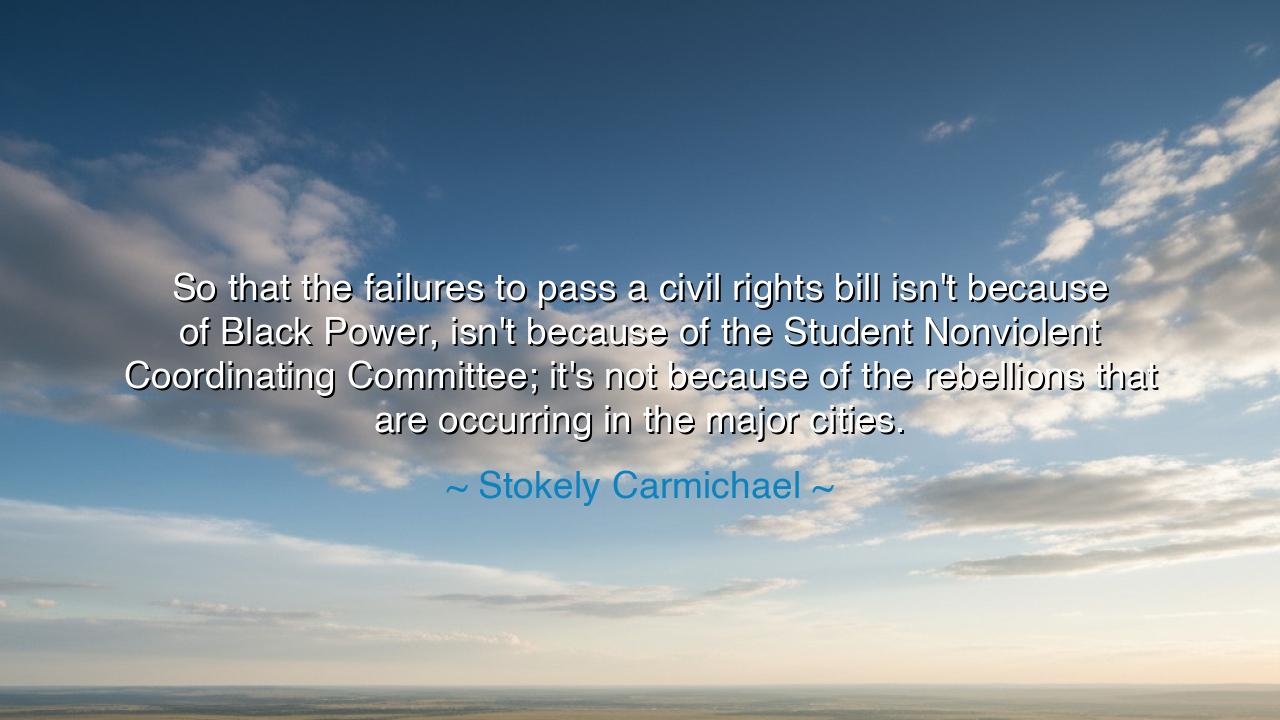
So that the failures to pass a civil rights bill isn't because
So that the failures to pass a civil rights bill isn't because of Black Power, isn't because of the Student Nonviolent Coordinating Committee; it's not because of the rebellions that are occurring in the major cities.






In this powerful statement, Stokely Carmichael, a fiery leader of the Civil Rights era, speaks of the struggle for justice and truth. His words seek to protect the reputation of movements like Black Power and the Student Nonviolent Coordinating Committee (SNCC) from being blamed for the failures of the government to pass a civil rights bill. Carmichael reminds us that the true reason for stagnation lies not with those fighting for freedom, but with those who refuse to act. His voice is both defiant and clarifying, ensuring that history does not distort the narrative of liberation.
The origin of this quote lies in the turbulent 1960s, when America was shaken by racial injustice, urban uprisings, and demands for equal rights. Carmichael was at the forefront of the movement, having risen through the ranks of the SNCC, an organization that fought bravely against segregation through nonviolent protest. However, as progress stalled and violence against activists escalated, frustration grew. Many blamed the rise of Black Power and the rebellions in major cities for political deadlock. Carmichael’s words push back against this falsehood, declaring that the failure was the result of a government unwilling to confront systemic racism.
History offers many parallels to this truth. During the abolitionist movement, enslavers often claimed that abolitionists were “stirring up trouble,” blaming them for violence rather than acknowledging that slavery itself was the root evil. Similarly, during colonial revolutions, imperial powers often accused freedom fighters of chaos, while ignoring their own oppressive rule. Carmichael’s statement fits into this long pattern: the oppressed are cast as the cause of unrest, while the powerful evade responsibility for their inaction.
Carmichael’s reference to rebellions in major cities points to the uprisings that swept places like Watts, Newark, and Detroit. These were not senseless riots, but cries of anger from communities long denied justice. By highlighting this, Carmichael reframes these events as symptoms, not causes. Just as a volcano erupts when pressure builds beneath the earth, so too do people rise up when their suffering is ignored. The true solution lies not in condemning the eruption, but in addressing the forces that created it.
Ultimately, this quote is a call to truth and accountability. Carmichael warns future generations to look beyond propaganda and scapegoating. The failure to bring justice is never the fault of those demanding it, but of those who hold power and refuse to wield it righteously. Let his words be a teaching: when history is written, let the oppressed not be blamed for their chains, and let the world remember that the burden of freedom lies with those who have the power to grant it, yet choose to delay.






BTBao Tran
Stokely Carmichael's words point to a broader issue of how social unrest is often framed as the cause of political inaction, rather than the symptom of a broken system. How often do we see protests and uprisings being blamed for the lack of legislative progress, rather than addressing the root causes of inequality? Shouldn't the focus be on why these movements emerge in the first place—because of longstanding injustices that need to be addressed?
QTNguyen Quynh Trang
Carmichael’s quote resonates with how often social movements are blamed for the lack of progress, even when they are pushing for necessary reforms. Why do people often misunderstand or fear the impact of these movements? Could this blame shift distract from the real underlying issues, such as institutional resistance to change? How can we address the systemic barriers to civil rights without letting external unrest be the scapegoat?
MLMai Lan
This quote from Stokely Carmichael brings to light how easily movements like Black Power and groups like the Student Nonviolent Coordinating Committee are scapegoated when civil rights progress stalls. Why is it that the real obstacles to change—like political opposition and systemic racism—often get overlooked? Could it be that these movements are too often viewed as threats, rather than as catalysts for necessary societal change?
H611-Gia Hieu 6a2
Stokely Carmichael's statement highlights the challenge of attributing the failure of civil rights bills to the actions of marginalized groups. It raises an important point about how external factors like activism and civil unrest are often blamed for political gridlock. Why do we tend to focus on the actions of protest movements rather than examining the structural issues preventing progress? Is it a way to deflect responsibility from the policymakers themselves?